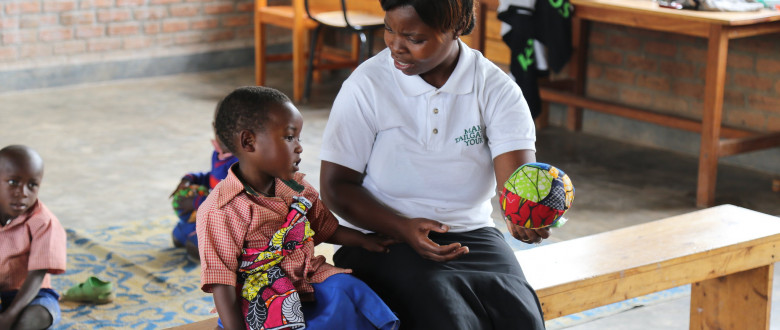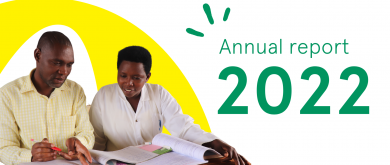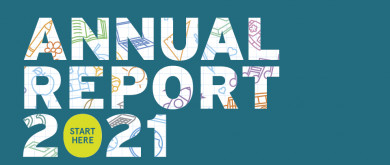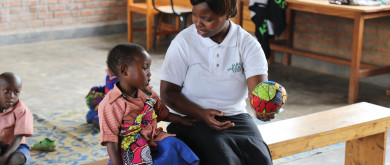
Promisingly, pre-school enrolment is increasing rapidly in countries across Eastern and Southern Africa (ESA), such as Zambia, Rwanda and Uganda. This positive trend, however, is not translating into higher learning outcomes in reading and mathematics in primary school in the ESA region: many children in grades 2 and 3 of primary education can hardly read, write or do basic maths operations. Improving school readiness through early childhood education (ECE) programmes is one of the key-strategies to improve these early grade learning outcomes. Contemporary definitions of school readiness stress its holistic nature incl. physical, socio-emotional, language and cognitive development, self-regulation, creativity, etc. (UNICEF 2021).
In many ECE classrooms, however, school readiness equals formal teacher-led literacy and numeracy instruction. Current instructional practices in ECE in these countries fail to actively engage learners and limit social interaction, favouring content-based rote learning over learning through play. Ironically, this strong focus on academic skills in ECE is an obstacle for the development of the emergent literacy and numeracy skills that prepare children to learn to read and write in primary school. Conversely, learning through play methodologies stimulate the holistic development of learners as described above, all the while creating an environment in which learners develop the literacy and numeracy skills necessary to be “ready” for school – and later life.
Teachers in Zambia, Uganda and Rwanda have strengthened skills to facilitate learning through play for emergent literacy and numeracy in early childhood education. These changes at classroom level catalyse change at national system level and in the community.
- Ministry of General Education (MoGE), Zambia
- Rwanda Education Board (REB), Rwanda
- Ministry of Education and Sports (MoES), Uganda
Using a similar approach in Zambia, Uganda and Rwanda, IT’S PLAY supports the implementation of an innovative teacher professional development (TPD) model to build play facilitation skills for ECE. The model couples high-quality descriptions of playful learning activities with support to teachers on child observation and self-reflection; and combines elements of the ‘emergent curriculum model’ and the ‘prescriptive model’ for building play facilitation skills at scale (LEGO Foundation, Jensen et al., 2019).
The project is based on four pillars:
- integrating learning through play (LtP) into government ECE policy and instruments
- strengthening the capacity of in-service TPD providers on LtP
- supporting TPD providers to train and coach 1,600 teachers
- building awareness of key stakeholders like school leaders and parents
By the end of the project:
- Government structures responsible for ECE coordinate, monitor and promote the use of LtP in ECE
- Government TPD providers have strengthened capacities to train ECE teachers on LtP; and implement TPD on LtP
- ECE teachers have improved understanding and skills to implement LtP for emergent literacy and numeracy; and implement playful learning methodologies
- School leaders and parents/guardians support LtP pedagogies in ECE
IT’S PLAY will be implemented in three different country contexts and at different levels of scale (sub-national in Zambia; pilot level in Rwanda and Uganda), using iterative learning cycles which will enable the contextualisation and continuous testing and improvement of this innovative approach to TPD on LtP.
IT’S PLAY is funded by the LEGO Foundation’s Play Our Part Initiative (POP). As part of the POP Initiative, the LEGO Foundation has created a Community of Practice in which the LEGO Foundation, VVOB, Innovations for Poverty Action (IPA), VSO and Plan International jointly test and refine approaches to strengthen LtP quality and reflect on and share learnings to contribute to building evidence and inform the ECE community.
To reach its goals, VVOB develops the capacity of its education partners. VVOB uses capacity development trajectories that give partners maximal responsibility in the execution and management of their own change processes. This is done through technical assistance provided by the VVOB teams in Zambia, Uganda and Rwanda, which includes both local and international educational and change management experts.
Picture above: ©GPE/Alexandra Humme. VESTINE NYIRAZUBA, pre-school teacher in her classroom at the Jean de la Mennais School in Burera district in rural Rwanda; teaching a student







